#nationalism
Text
It took a Saskatoon jury less than two hours to reject Travis Patron's claim that he followed an off-duty RCMP officer around a downtown mall, yelling racial insults, as a matter of national security.
"Having a jury of his peers, of Canadians, saying no, this wasn't right and what you did was wrong, is exactly what our society stands for and that upheld the administration of justice," prosecutor Lana Morelli said in an interview.
"Some of the things that Mr. Patron put forward as part of his defence in my mind didn't make sense, because it's not an issue of national security that two individuals that have different skin colours are walking around together."
Continue Reading
Tagging @politicsofcanada
#cdnpoli#canadian politics#canada#canadian news#saskatchewan#racism#white supremacy#nationalism#canadian nationalism#canadian nationalist party
311 notes
·
View notes
Text
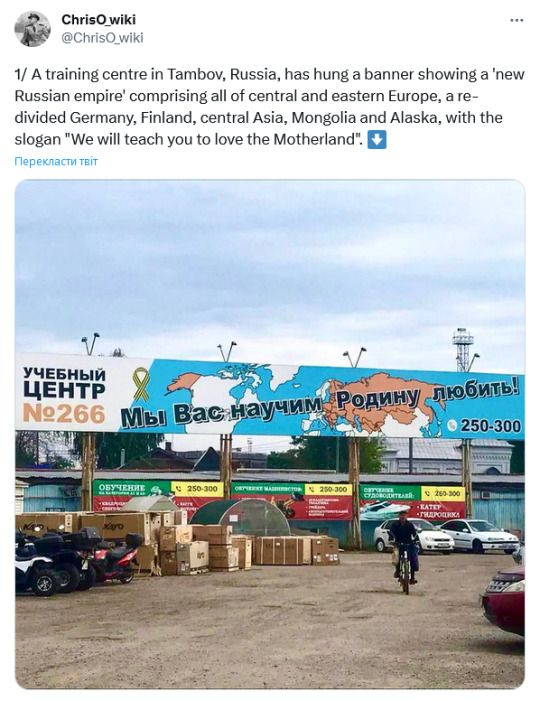
#war in ukraine#russia#russian culture#russian nationalism#rashism#rushism#nationalism#fascism#nazism#russian chauvinism
286 notes
·
View notes
Quote
It is the very concept of the nation that needs to be suppressed — or rather, the manner in which the word is used. For the word national and the expressions of which it forms part are empty of all meaning; their only content is millions of corpses, and orphans, and disabled men, and tears and despair.
Simone Weil, "The Power of Words"
106 notes
·
View notes
Text
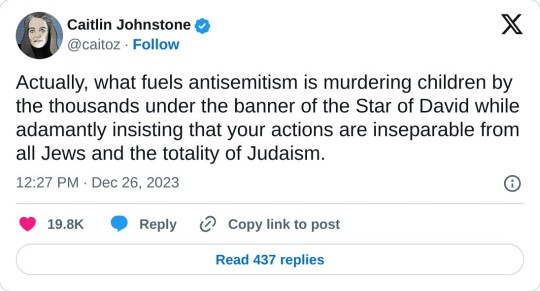
#antisemitism#anti israel#star of david#jews#judaism#free palestine#politics#tw discourse#jew#jewish#ethnonationalism#nationalism#mudering children mentioned#zionism
95 notes
·
View notes
Text
For Hobsbawm and Ranger, historicizing tradition means finding the historical means by which a tradition was first invented and then naturalized as tradition. Tradition is sharply distinguished from custom [...]. Custom simply refers to a set of practices that combine flexibility in substance with formal adherence to precedent [...]. Tradition, on the other hand, is a set of rituals and symbolic practices that are fundamentally ideological rather than practical. Tradition, as Hobsbawm uses it, is bad, because it is usually a kind of modern ideological mystification which is installed as a constant by the elites and governments whose real interests are thereby served. To show that traditions are invented is in effect to show that traditions are not true, nor real, not legitimate.
[...] The clearest example of how the "invention of tradition" ploy can go wrong can be seen in the article by Hugh Trevor-Roper, "The Invention of Tradition: The Highland Tradition of Scotland" (Hobsbawm and Ranger 1983, 15-41). Trevor-Roper begins by arguing that the kilt, the tartan, "the clan, and even the bagpipe, rather than being signs of great antiquity and cultural distinction, are "in fact largely modern." If these things existed before the Union with England at all, Trevor-Roper asserts, they did so only in "vestigial form," and as signs of "barbarism." Trevor-Roper goes on: "Indeed, the whole concept of a distinct Highland culture and tradition is a retrospective invention. Before the later years of the seventeenth century, the Highlanders of Scotland did not form a distinct people (15)." And so Trevor-Roper proceeds to demonstrate, with convincing historical flair and wit, the recent vintage of Scottish national culture.
The only problem with Trevor-Roper's argument is that while Hobsbawm debunks mystification in general as well as in the particular forms of its manipulation by states, ruling classes, or colonial powers, Trevor-Roper debunks the the necessary claims of Scottish nationalists — necessary because of the hegemonic terms that became set in the eighteenth century for nationalist or populist political aspirations — that Scotland had its own authentic traditions, epics, and histories. Indeed, Trevor-Roper's argument has a genuine colonial ring to it, for, in recounting the invention of clans and kilts and the forgery of the great epic Ossian, it uses smug notions of authenticity and historical privilege to contest what appear to be absurd claims about Scottish customs and traditions. At the same time, and with similar colonial resonance, Trevor-Roper uses his historical mastery to conceal his own moral position, one that appears to justify, at least to support, the unification claims of the British state. The effort to historicize tradition and custom can thus both expose the mystifications of cultural hegemony, and be appropriated by them. When historical methods are used as if the methods themselves are exempted from historical scrutiny and critique, history becomes a way of deauthenticating everything but its own authority, denigrating difference and displacing the categories and logics of historical discourse.
– Nicholas Dirks, "Is Vice Versa? Historical Anthropologies and Anthropological Histories." In The Historic Turn in the Human Sciences. Terrence J. McDonald, ed. pp. 17–51. Ann Arbor: University of Michigan Press. pp. 21–2.
86 notes
·
View notes
Text
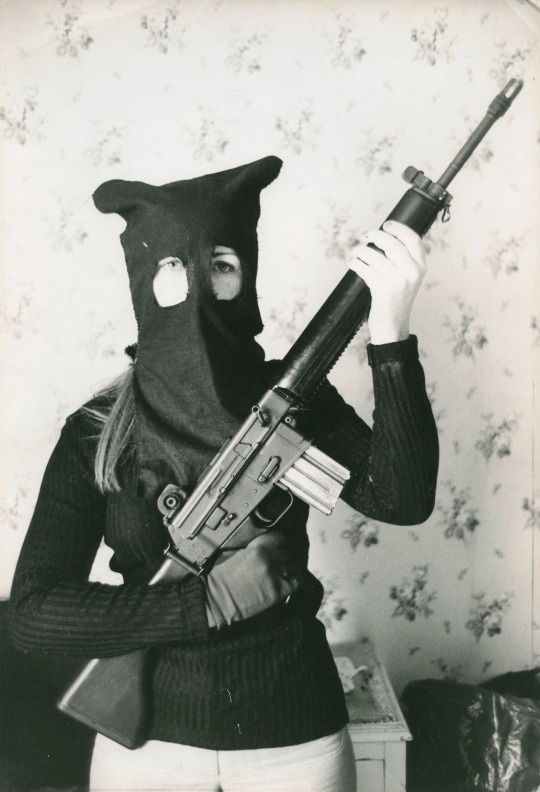
Female IRA fighter during the height of the troubles.
#aesthetics#aethestic#girls with guns#nationalism#ira#the troubles#irish republicanism#irish republican army#Ireland#northern ireland#Irish women#Irish civil war#english history#english heritage#irish heritage#irish independent
66 notes
·
View notes
Text
Sooner or later I've gotta make a better post regarding the appropriation of indigenous terminology by proponents of (certain kinds of) Welsh nationalism. But for now here's a very whistle-stop version of that post. I have a degree in Celtic Studies so these topics are very near and dear to my heart.
[Note: I wrote this post originally during a migraine. I'm revisiting the draft while I'm ill but hopefully can fix this up into something somewhat understandable. As always, this is only a very brief description of the history and I strongly reccomend reading about these topics in your own time to develop a deeper understanding of them. These are topics not even well known in Britain, but if you can spend a short time just to read this, you can help to combat misinformation about British (particularly Welsh) history - and that could aid in preventing the misappropriation of history in the long run. Diolch eto for reading!]
Very often, (certain) Welsh nationalists use terminology that positions the Welsh as if they are an 'indigenous' population who have been 'colonised'. They use language (which in this climate) heavily draws upon the language typically used for peoples who are the victims of British colonialism (of which Wales was an active participant). There's multiple issues with this and many of them lie in whether its appropriate to use this language (regardless of its accuracy or not) as a country which was actively involved in the colonisation of much of the world. What I mean in short is that additional language is needed which doesn't step on the toes of endangered cultures and groups directly affected by British colonialism.
Wales not only participated in British colonialism as a whole (alongside Scotland, Ireland* and England) but itself colonised parts of patagonia in Argentina.
I can't think of any similar terminology to 'indigenous' or 'colonised' which would also get the idea which is meant across. 'Native' in certain contexts is permissible, e.g. 'native speaker' in the context of a Welsh speaker. But in other contexts other than langauge, things get tricky when you argue 'nativeness' (this is a topic I will come back to - especially re. Celtic as a language descriptor vs Celtic as a so-called ethnicity). When (certain) Welsh nationalists talk about being 'indigenous' , being 'native' or 'colonised' what is meant by that?

(Map of the expansion of the Bronze Age Bell Beaker culture circa 2400 BC in Britain and Ireland) - from this map
What makes a Welsh person 'indigenous' to this island that doesn't immediately disqualify other peoples who also have a deep history here? Historically, the island of Britain has been lived on by many, many peoples.
In the Bronze Age you had the arrival of the Bell Beaker people. Then in the Iron-Age, you had tribes speaking (mostly) Brittonic. I say mostly, because we have direct evidence that in the Iron Age Gaulish speaking tribes also moved to parts of Britain but later became integrated with the rest of the population (which, I will add, were not a united peoples but a scattering of different groups who often went to war against each other). Then the Romans invaded Britain (and much of Western Europe) and over time integrated into the local population. So now Britain is Romano-British. Eventually the Western Roman Empire collapses and Britain enters into the sub-Roman Britain phase of its existence. Kingdoms begin to form, with the population speaking Brittonic and British-Latin. So you have different kingdoms in (what would become Wales) and in (what would become Northern England and Southern Scotland) you have more Brittonic-speaking kingdoms.
These kingdoms were also not a united peoples. They shared a language - but it's like claiming that Ancient Greeks were a united people simply because they all spoke Greek. Sparta, Athens, Cornith etc. were independent of each other and the same is true of the kingdoms of the Hen Ogledd (the Old North) and the kingdoms of Wales. They all had a common language but also went to war with each other sometimes. Eventually, the Brittonic language began to diverge into different languages. Namely, Old Welsh and Cumbric (the language spoken in what is today Cumbria, Lancashire, Northumberland and Southern Scotland). The two languages were still very closely related but had diverged by a certain point.
At the same time this is happening, Anglo-Saxons begin to arrive in what is now Kent. They form kingdoms and the Britons living there are either displaced or become absorbed into the Anglo-Saxon populace. Then the Norse rock up and conduct viking raids around the coast before finally settling in parts of the country and forming their own territories.
So now Britain has several groups living on the island (keeping in mind even before settlement from the Anglo-Saxons and the Norse that the British kingdoms were already composed of different groups themselves). Northern Scotland was also having a time re: Picts, Gaels and Britons - but we'll gloss over that for brevity. Also, Ireland was also raiding the Welsh coast at this time too.
Then the Normans rock up and in 1066 William the Conqueror, well, conquers. More history happens after this point but I will try and keep this as brief and as non-messy as I can.
So, to recap:
One of the earliest cultures in Britain was the Bell Beaker people in the Bronze Age. They had their lands settled by the Iron Age Britons ('Celts'). Then the Romans came and the 'Celts' became Romano-Britons. After the Western Roman Empire collapses the remaining population forms kingdoms with distinct political identities. These kingdoms eventually find themselves fighting the Anglo-Saxons and the Norse. Then the Normans turn up and so on and so forth.
So- which group is the original native group to Britain? (Trick question - this question cannot be satisfactorily answered in favour of one group without leaning into claims of historicity which the other groups can also claim).
Which brings me to modern Welsh identity and those who came before.
Something I see in Welsh nationalist groups is a claim to the legacy (or even claims of direct descendance from) the Iron Age Britons (commonly called Celts for shorthand, but as I said before I'm gonna get back to that point). And this narrative is what the "Welsh people are native to Britain" argument is based off of.
It may seem like #praxis to argue the Welsh people are the true inhabitants of Britain and the English are evil invaders. But you have to make *several* logical leaps to get to that point if you're genuinely arguing that point.
For starters, many more people than just the Britons (read: Romano Britons/early Brittonic kingdoms) have called Britain home since the Early Middle Ages. For example, there's the settlement of Scotland by the Gaels, the Irish settlement of certain parts of costal Wales. You have (much later) Roma and traveller groups, Jewish diaspora and many more diverse cultures and peoples existing in Britain at this time. The Romano-British population, which developed into the Early Middle Ages kingdoms of Wales and the Hen Ogledd, was also multicultural. Many black Romans started families with white Britons. By the sub-Roman period, Britain was ethnically and culturally diverse.
But those who argue in favour of a such thing as 'Celtic ethnicity' in order to support the idea Britons (and only Britons) were native to these islands typically imagine that history as white. White Brits, white Romans, white Gaels. When we know this isn't true. Did you know that the Northernmost Ancient Egyptian temple in the world is in Yorkshire because Roman Egyptians in the military brought their religion with them? Mary Beard did a fantastic documentary about a Roman Soldier from modern day Syria who was stationed at Hadrian's Wall who started a family with a British woman. Point is, that some people like to imagine a purely white Britain that they can pine for. And I'm afraid it simply isn't true. The version of history many white supremacists look to simply didn't exist.
I'll quickly bring up one last point before I draw this to a close. And it's about Celtic as a linguistic term vs Celtic as a so-called ethnicity. You see, any first year Celtic Student would tell you that there is no such thing as 'Celts'. Crazy, I know from people studying *Celtic* studies. But hear me out - there is good reasoning why (beyond language groups) Celtic is not a good term for describing an ethnic group. Much of it relates to what I've already mentioned, but we categorise Ireland, Scotland, Wales, Mann, Cornwall and Brittany as Celtic not because of the ethnicity of the people living there (which I've mentioned is pretty diverse) but because they are all places where Celtic languages are spoken. It wasn't until Edward Llwyd (d. 1709) that the term Celtic was coined to describe these languages. Up until that point, nobody was thinking of Irish and Welsh as related because the languages do not sound like they have a common origin. By extension, people didn't think of the Welsh and Irish as being the same peoples (or Celtic) either. Its only in the modern day there is a sense of Celtic identity. The Iron Age Britons were not going around calling themselves Celts. There was no common Celtic identity. But very often people argue Celticness based on a pseudohistory which insists on a false and misleading interpretation of history. Whether or not Celticness exists now is a different matter entirely. But it sure does not rest upon race or ethnicity as a qualifier. This is quite foundational stuff to first year and above Celtic Scholars, but is not generally well known outside of academia because the misinformation is quite strong. So if you read is far, diolch mawr and please share this with anyone you think might be interested in it. Any amount of knowledge of these things would greatly improve understanding of what it means to be Welsh and what it means to speak a Celtic language.
Lastly,
all of that begs us to ask the question:
What does it mean to claim nativeness in a Western European context?
More under the cut
What does it mean to claim nativeness in a Western European context? Especially in a Western Europe post-colonialism.
It means, to me, to claim what isn't our right to claim. To argue and make our points with language that isn't ours and isn't designed to be ours. That this language of indigeneity may sound appealing, but is it improper to use this terminology when our country was directly responsible for the atrocities in which this very language became relevant?
What do we do in response to the misinterpretation of our culture instead of relying on language of indigeneity? These are the questions I want to leave you with and invite you to share your thoughts on. How do we build a Wales which advocates for itself without relying upon inaccurate language which betrays a reliance upon the ahistorical to make its point?
What kind of Wales do we want to live in?
#cymraeg#welsh#cymru#cymry#cymblr#Wales#welsh language#welsh nationalism#nationalism#indigeneity#?#white supremacist mention#white nationalism cw#please add on if you have any thoughts on the matter - I'd love to hear other's takes on the topic!#this post was also mostly made when I was ill/had a migraine so it may not be perfect#but gets most of what I want across well enough I think
100 notes
·
View notes
Text
definitely a longer piece so these excerpts are far from showcasing everything this piece has to offer! read the whole thing on your own time, and in general, just check out jewish currents, an educational, leftist, anti-zionist jewish magazine!
Every August, the township of Edison, New Jersey—where one in five residents is of Indian origin—holds a parade to celebrate India’s Independence Day. In 2022, a long line of floats rolled through the streets, decked out in images of Hindu deities and colorful advertisements for local businesses. People cheered from the sidelines or joined the cavalcade, dancing to pulsing Bollywood music. In the middle of the procession came another kind of vehicle: A wheel loader, which looks like a small bulldozer, rumbled along the route bearing an image of Indian Prime Minister Narendra Modi aloft in its bucket.
For South Asian Muslims, the meaning of the addition was hard to miss. A few months earlier, during the month of Ramadan, Indian government officials had sent bulldozers into Delhi’s Muslim neighborhoods, where they damaged a mosque and leveled homes and storefronts. The Washington Post called the bulldozer “a polarizing symbol of state power under Narendra Modi,” whose ruling Bharatiya Janata Party (BJP) is increasingly enacting a program of Hindu supremacy and Muslim subjugation. In the weeks after the parade, one Muslim resident of Edison, who is of Indian origin, told The New York Times that he understood the bulldozer much as Jews would a swastika or Black Americans would a Klansman’s hood. Its inclusion underscored the parade’s other nods to the ideology known as Hindutva, which seeks to transform India into an ethnonationalist Hindu state. The event’s grand marshal was the BJP’s national spokesperson, Sambit Patra, who flew in from India. Other invitees were affiliated with the Hindu Swayamsevak Sangh (HSS), the international arm of the Hindu nationalist paramilitary force Rashtriya Swayamsevak Sangh (RSS), of which Modi is a longtime member.
...
On December 6th, 1992, a mob of 150,000 Hindus, many of whom were affiliated with the paramilitary group the RSS, gathered at the Babri Masjid, a centuries-old mosque that is one of the most contested sacred sites in the world. Over the preceding century, far-right Hindus had claimed that the mosque, located in the North Indian city of Ayodhya, was built not only upon the site where the Hindu deity Ram was born but atop the foundations of a demolished Hindu temple. The RSS and its affiliates had been campaigning to, in the words of a BJP minister, correct the “historical mistake” of the mosque’s existence, a task the mob completed that December afternoon. “They climbed on top of the domes and tombs,” one witness told NPR. “They were carrying hammers and these three-pronged spears from Hindu scripture. They started hacking at the mosque. By night, it was destroyed.” The demolition sparked riots that lasted months and killed an estimated 2,000 people across the country.
The destruction of the Babri Masjid was arguably Hindu nationalism’s greatest triumph to date. Since its establishment in 1925, the RSS—whose founders sought what one of them called a “military regeneration of the Hindus,” inspired by Mussolini’s Black Shirts and Nazi “race pride”—had been a marginal presence in India: Its members held no elected office, and it was temporarily designated a terrorist organization after one of its affiliates shot and killed Mohandas Gandhi in 1948. But the leveling of the Babri Masjid activated a virulently ethnonationalist base and paved the way for three decades of Hindutva ascendance. In 1998, the BJP formed a government for the first time; in 2014, it returned to power, winning a staggering 282 out of 543 seats in parliament and propelling Modi into India’s highest office. Since then, journalist Samanth Subramanian notes, all of the country’s governmental and civil society institutions “have been pressured to fall in line” with a Hindutva agenda—a phenomenon on full display in 2019, when the Supreme Court of India awarded the land where the Babri Masjid once stood to a government run by the very Hindu nationalists who illegally destroyed it. (Modi has since laid a foundation stone for a new Ram temple in Ayodhya, an event that a prominent RSS activist celebrated with a billboard in Times Square.) The Ayodhya verdict came in the same year that Modi stripped constitutional protections from residents of the Muslim-majority region of Kashmir and passed a law that creates a fast track to citizenship for non-Muslim immigrants, laying the groundwork for a religious test for Indian nationality. Under Modi, “the Hinduization of India is almost complete,” as journalist Yasmeen Serhan has written in The Atlantic.
To achieve its goals, the RSS has worked via a dense network of organizations that call themselves the “Sangh Parivar” (“joint family”) of Hindu nationalism. The BJP, which holds more seats in the Indian parliament than every other party combined, is the Sangh’s electoral face. The Vishwa Hindu Parishad (VHP) is the movement’s cultural wing, responsible for “Hinduizing” Indian society at the grassroots level. The Bajrang Dal is the project’s militant arm, which enforces Hindu supremacy through violence. Dozens of other organizations contribute money and platforms to the Sangh. The sheer number of groups affords the Sangh what human rights activist Pranay Somayajula has referred to as a “tactical politics of plausible deniability,” in which the many degrees of separation between the governing elements and their vigilante partners shields the former from backlash. This explains how, until 2018, the CIA could describe the VHP and Bajrang Dal as “militant religious organizations”—a designation that applies to non-electoral groups exerting political pressure—even as successive US governments have maintained a warm relationship with their parliamentary counterpart, the BJP.
...
The most extreme figures in the Hindu nationalist and Zionist movements were especially frank about the nature of their partnership: “Whether you call them Palestinians, Afghans, or Pakistanis, the root of the problem for Hindus and Jews is Islam,” Bajrang Dal affiliate Rohit Vyasmaan told The New York Times of his friendly relationship with Mike Guzofsky, a member of a violent militant group connected to the infamous Jewish supremacist Meir Kahane’s Kach Party.
...
In 2003, Gary Ackerman—a Jewish former congressman who was awarded India’s third-highest civilian honor for helping to found the Congressional Caucus on India—told a gathering of AJC and AIPAC representatives and their Indian counterparts that “Israel [is] surrounded by 120 million Muslims,” while “India has 120 million [within].” Tom Lantos, another Jewish member of the caucus, likewise enjoined the two communities to collaborate: “We are drawn together by mindless, vicious, fanatic, Islamic terrorism.”
#reaux speaks#hindutva#nationalism#islam#religion#india#narendra modi#south asia#muslim#new jersey#Bharatiya Janata Party#history#resources#jewish currents#anti zionism#palestine#islamophobia#afghanistan#hindu#jewish#free palestine#israel
157 notes
·
View notes
Text
This. This is a devastatingly perfect summary of the climate of the U.S. in the 1990s, the climate Animorphs was written in and responding to. Animorphs anticipates the post-9/11 cultural shift, because that cultural shift didn't happen overnight.
89 notes
·
View notes
Text
181 notes
·
View notes
Note
I was very pleased with my English 1820s man. I made sure he had enrichment of a scholarly nature, to balance out the Romantic tendencies they have. He took to studying classical history and language, and I confess I was proud to have such an intelligent 19th century man. More recently he took an interest in current affairs but, as he is quite young, I assumed this was a sign of maturing. Then, just like that, he ran away! I went out searching and a neighbour informed me that he'd gone to Greece to fight against the Ottomans! I was horrified and went straight there, but I found him with a pack of Greek 1820s men and he adamantly refused to come home. What should I do? I worry that he will get hurt fighting, or that his constitution will not survive rough living in the Greek mountains. But he's having such a good time. He is learning the modern iteration of Greek (such a clever man), enjoys the local cuisine, and even wants to dress like his new friends. Is he in great danger if I let him stay, and how could I take him home without breaking his heart? (I don't want to risk any of those Greek 1820s men getting angry either, if I take their lucky mascot away.) Many thanks for your advice!
Romanticism and nationalism make for a very potent combination, as you have learned by now, and for many 19th century men of a certain social class and level of education, the attraction of the Classical world adds another layer of mythical folklore; not to mention the allure of pagan ceremony and skimpy neoclassical clothes.
For 1820s-1830s men, the Byronic appeal of exotic "Eastern" nations can be irresistible, and in general you will find a lot of national myth-making and interest in folk costumes.
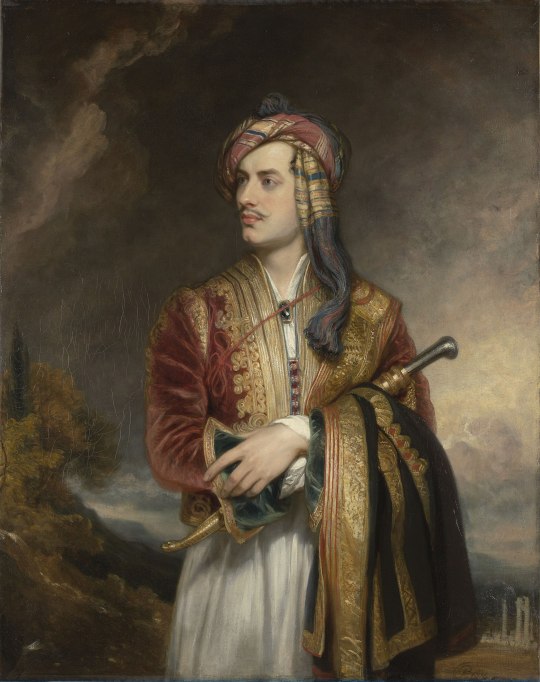
Lord Byron in Albanian dress, 1813. This man is not Albanian!
You also have to be aware of your 19th century man's possibly very different ideas of national and imperial boundaries. He learns the polka in Bohemia, he wants to fight the Ottomans, he wants to fight in the Miguelite war—he might support Romantic German nationalism! It's not always the national and cultural understandings of the 21st century.
Being British is also not a guarantee of sensible behaviour. You might think that your British naval officer is going to rest on his laurels after the Napoleonic Wars, and the next thing you know, he's leading a fleet in the Chilean Independence movement!

Thomas Cochrane, naval officer for hire.
19th century men are not for the faint of heart. It can be challenging to balance their Romantic desires with a sensible course of action. Since your man has already spent so much time with his new Greek friends and has embraced their lifestyle, you could suggest that it's important that he document his experiences in a travel narrative that will also champion their cause.
As much as possible, you want to convince him that he's very valuable as a writer and/or visual artist giving voice to a cause—too valuable to foolishly risk his life or ruin his health abroad.
#is the 19th century man okay#asks#romanticism#nationalism#1830s#1820s#more problems caused by lord byron
128 notes
·
View notes
Text
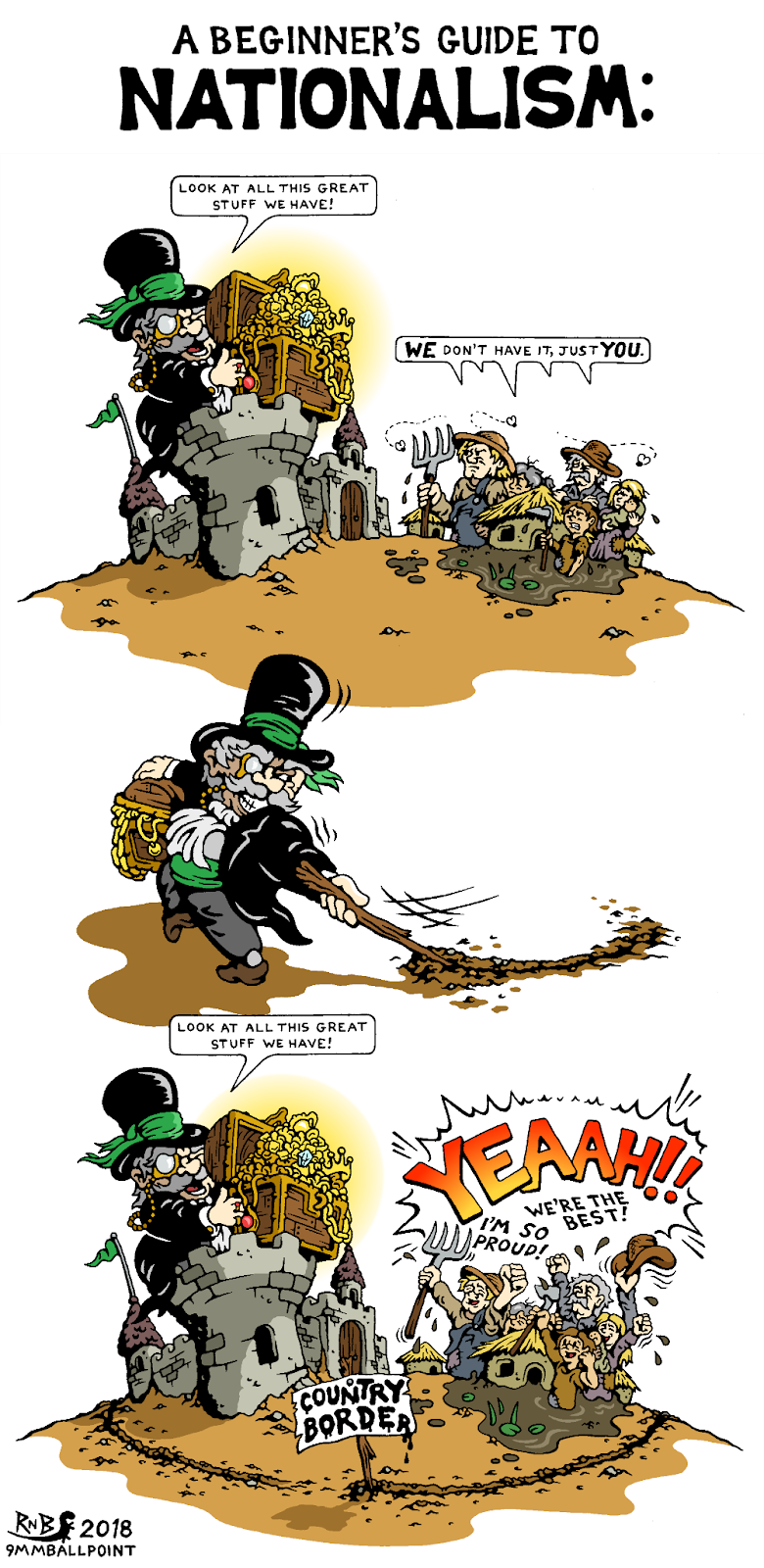
nationalism is a bullshit ideology that is manufactured by the rich to make you feel connected to a class of rulers that you share nothing in common with
90 notes
·
View notes
Text
can one be irredentist for the past? claiming a historical figure for your national mythos who had never heard of your nation-state and didn't even live in its territory? especially if you're trying to (re)claim that figure from a nation you have a grudge against for some reason
94 notes
·
View notes
Text
not a dream
frustrating that the World Cup results brought out so many people's hidden or not so hidden racism, xenophobia, islamophobia, nationalism, but at least the trash is taking itself out
all of this over soccer scores!
I hope Morocco and Croatia keep making people mad, I guess
404 notes
·
View notes
Text
I'm wheezing. Israel is just a small US. No wonder the US spoils it rotten, it's just a chip off the old block! The US gave birth to...itself. 🤣😭🤣


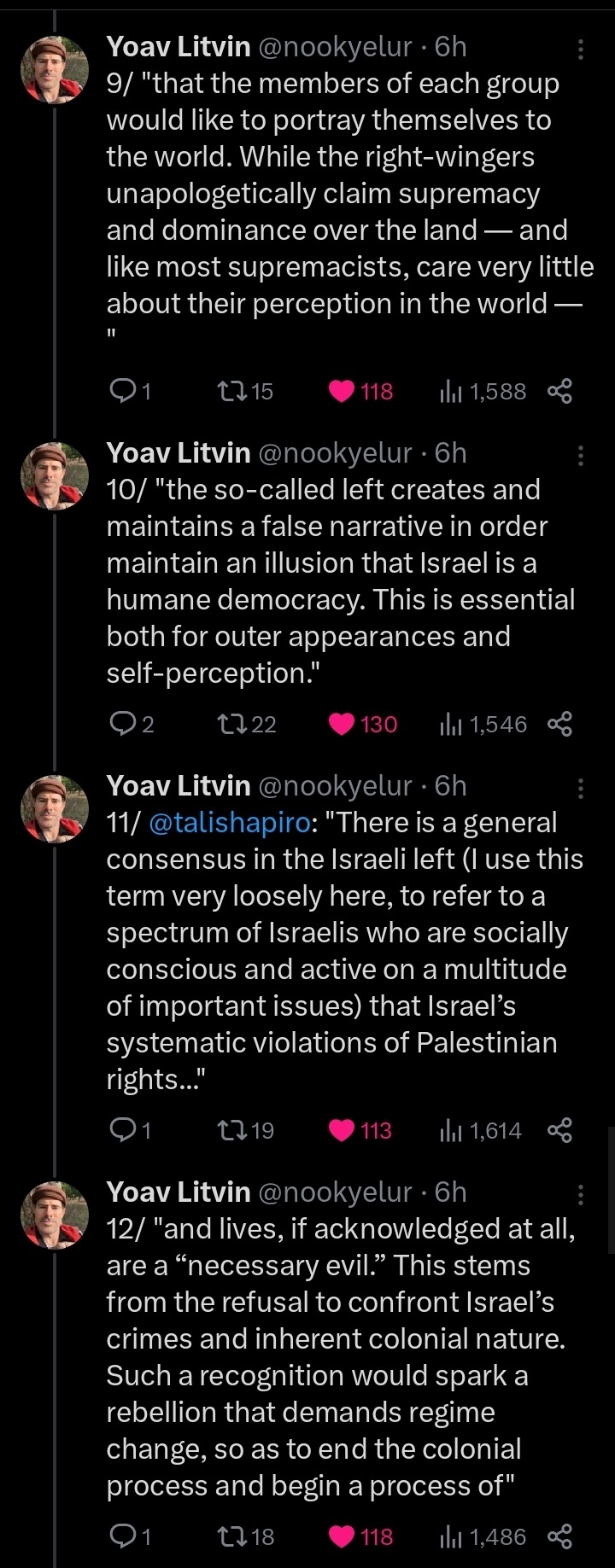

I haven't read them yet but there are two books about this in my Google drive. Yitzhak Laor, José Saramago, The Myths of Liberal Zionism, Verso Books (2017) and Tikva Honig-Parnass, False Prophets of Peace: Liberal Zionism and the Struggle for Palestine, Haymarket Books (2011).
I think it's past time we took Audre Lorde's "the master's tools will never dismantle the master's house" seriously.
#liberal zionism#tell me again Not All Israelis#ALL of them are complicit#anti zionism#anti zionist#fuck israel#war crimes#gaza genocide#palestinian genocide#white supremacy#ethnic cleansing#free palestine#western imperialism#colonization#colonialism#pinkwashing#neoliberalism#nationalism#racism#islamophobia#us imperialism#knee of huss#yoav litvin
82 notes
·
View notes
Text
I see a lot of articles and public posts these days about “your Jewish friends” and how we all supposedly feel.
I was raised in a secular American Jewish family. I have never been to Israel. I don’t speak Hebrew. No one in my immediate family is a supporter of Israel, as far as I am aware in every discussion I’ve had with them, they are appalled by the actions of Israel and have been for decades.
But that’s not the case with my extended family. In fact even discussion of the subject has torn parts of my family apart and some folks are no longer speaking with each other. Which was already the case well before the current increase in violence.
And it's not the case with my circle of friends and colleagues. Many Jewish peers of mine - past and present - are espousing views that do not represent me in the slightest, some of which horrify me, and which often claim to represent me. They don't.
To some Jewish people, I’m probably considered a “fake Jew”. I don’t really give a shit. I hate purism in all forms anyway. Judaism is and always has been a major part of my identity, and my ethnicity, and that’s not going to change because of anyone else’s opinion, or by how anyone reacts to mine.
I have a lot of complicated thoughts about the existence and history of Israel, just as I do my own nation - America - both nations built on stolen land, both nations’ very existence a product of settler colonialism.
But right now I’m not doing a deep dive into the history. I just want to say something really simple:
If you consider yourself Jewish, and you are appalled by the actions of Israel - whether the Netanyahu government specifically or deeper into history - if you are confused and horrified by nationalism, by state violence, or if you feel that you aren’t “truly” Jewish, or if you feel alienated from your peers or community because you have any or all of these conflicted feelings, please know this:
You are not alone
97 notes
·
View notes